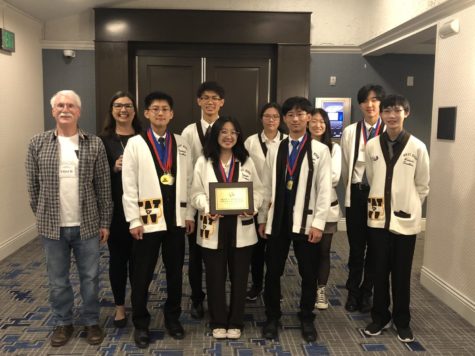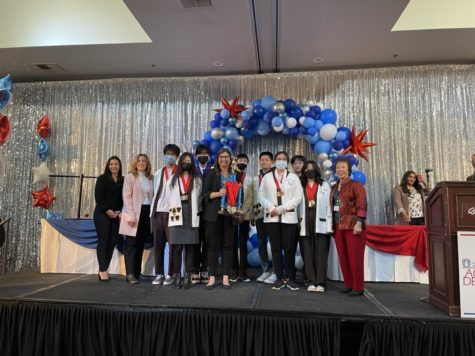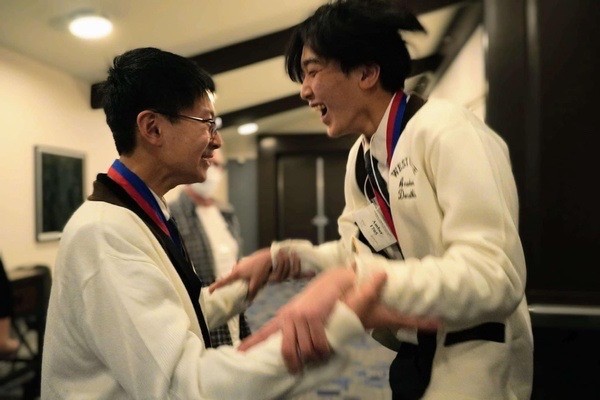Academic Decathlon Wins 2nd In County, Top 7 At State
May 19, 2023
What’s the product of 2½-hour daily practice after-school, rigorous discipline, ten additional subjects to study, and over 700 pages of literature to read? A 2nd place win for West High’s Academic Decathlon at the county competition, a 7th place ranking at state, and indelible memories created along the way. Acadec, whose competition season ran from late January to late March, began to prepare as early as last spring and throughout the summer. They persevered through all of the first semester to score an impressive 39,801 points at the county level and a whopping 43,234 points at state out of a possible 60,000 points.

The multidisciplinary competition, where students can showcase their academic prowess across ten events, consists of seven ‘objective’ disciplines (art, economics, literature, math, music, science, and social science) and three ‘subjective’ disciplines (essay, interview, and speech). Competing in teams of six to nine students (West High drafted eight on their main team), Decathletes are grouped into Honors, Scholastic, and Varsity designations based on their GPA. Schools that have at least twelve members in Acadec can furnish both a main and junior team.
This year’s curriculum delved into “The American Revolution and the New Nation”, with Decathletes studying iconic works like Paul Revere’s engraving of the Boston Massacre and George Washington’s Farewell Address, to more obscure pieces like Washington Irving’s Rip Van Winkle and Alexander Hamilton’s Federalist Papers — all with a dash of Keynesian economics and trigonometry.
With a roughly eight-month timetable and a compressed practice duration throughout (previous years entailed 3-hour, sometimes 4-hour practices), Decathlete Qinghan Jia (10), the team’s top-scorer in both county and state competition, explained that “we just shortened all the practice times, but that actually increased our score.” While it might sound counterintuitive, especially for a trivia-laden competition, Jia shared that “[he] felt like it was more productive” after Acadec coach Mrs. Hettinger was able to “find that equilibrium” and maximize students’ efficiency.
Jia noted however that practice durations increased incrementally throughout the season, similar to previous years: “in the beginning of the year, [practice] was [until] five, and then we went to 5:30, and then sometime around December or January, [we sent] them to six.” Not to mention, some Decathletes partook in grueling “full study days” on the eve of competition.
Individually scoring 7,292 points out of a possible 10,000 at the county competition, Jia increased his score to 8174.6 at state. He attributed his success to being appointed to Acadec’s main team this year, which encouraged him to “step it up, because [he didn’t] want to sort of drag the team down.” A first-time delegate for the main team, Jia recalled how the county results were “definitely a big surprise.” Even more so, Jia recounted the nervous anticipation at the state competition as the top ten schools were announced: “they started counting down from ten, and then at nine, we didn’t get called and we’re like ‘okay, maybe eight.’ But that wasn’t us.” Fearing West High placed outside of the top ten, the team was both relieved and ecstatic when they placed seventh.
“I think the biggest reason [for] our score jump was the fact that our Varsity [score] this year [increased] a lot,” Jia observed.

Joshua Zhang (11), another member of the main team, raked in a stellar 7053.2 points at the state competition. Like Jia, Zhang was a first-time member of the main team, so “[his] greatest goal this year was to put [his] best foot forward and make as much progress as possible.” Zhang realized that he’s “come to understand how much further [he] can improve if [he] make[s] that decision to take the next step.” Zhang expressed similar elation with the team in their victory, his only reservation being that “though 2nd in county and 7th in state is not bad, [he is] determined to do better.”
As the coach for the speech and interview “subjective” events, Mr. Ronne explicated the rationale behind the team’s success this year, delineating two types of goals the students set for themselves.
“Tangible, or internal goals,” Mr. Ronne posited, are quantifiable objectives — the desire to win individually and as a team, earn medals, score high, and beat incumbent county champion Mark Keppel High School. But as a caveat, these goals can be both “beneficial and harmful” if students mount unrealistic expectations for themselves, he cautioned Decathletes.
More important were the team’s “intangible goals,” such as “honoring the process.” Especially for speeches and interviews, it was imperative that Decathletes “invested in the process” by striving to be more comfortable expressing themselves in front of an audience — a skill that requires time, tenacity, openness to constructive feedback, and a willingness to be vulnerable.
The goal of counseling the ‘subjective’ events is “not teaching [Decathletes] to win medals,” but rather to teach them “to communicate effectively with others,” Mr. Ronne clarified.
As Acadec embarks on its spring recruiting season for next year, Mr. Ronne acknowledged that the Achilles’ heel of Acadec is that “the teams change every year,” requiring a careful recalibration, as well as an extensive campaign to recruit the seemingly scarce and fleeting members in the Varsity category. He also revealed that it was a challenge “to get [everyone’s] speeches together,” aiming to “ideally get speeches done earlier” next year to allocate more time to the interview and impromptu event segments. Needless to say, Mr. Ronne praised the team for “prioritizing their effort in the process” and their “intense focus” throughout the season.
For now, Decathletes can relish their achievements before another rigorous season — its topics never ceasing to fascinate — rolls around. Per the United States Academic Decathlon curricular preview, next year’s theme is “Technology and Humanity”, which will explore the technologies employed in art and science-fiction, modern and digital innovations, neuroscience, and a comprehensive history of the computer.

